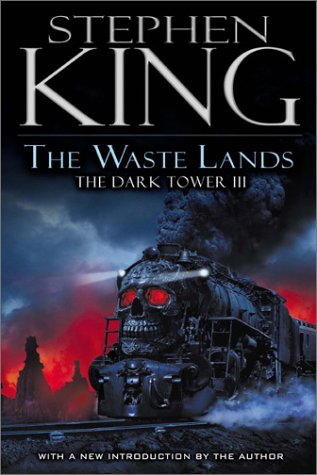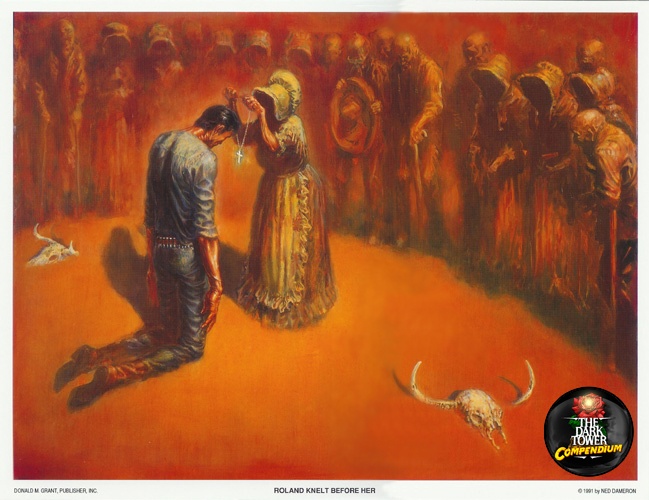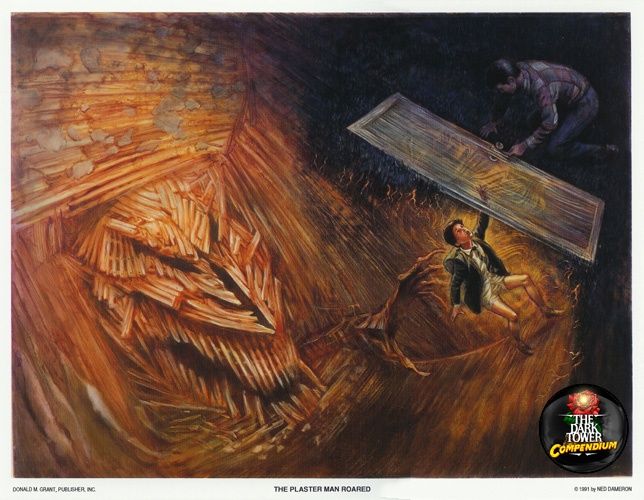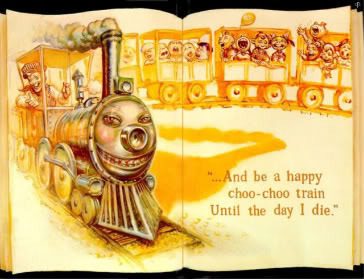In anticipation of Nikolaj Arcel’s upcoming screen adaptation of Stephen King’s The Dark Tower series (starring Idris Elba and Matthew McConaughey), the Deadshirt ka-tet of Max Robinson, Dom Griffin and David Uzumeri are taking a trip through the unique and sprawling fantasy/western novel series that inspired it.
Max: We’re chugging right along into Book #3 with The Waste Lands, which is tasked with getting the rest of King’s heroic ensemble assembled and also significantly advancing their quest. After two books of Roland largely booking it through the ass end of nowhere, we get a better look at the New York City Eddie and Jake knew, as well as significant detours to the terrible city of Lud.
David: The Dark Tower III: The Waste Lands (as the original cover art advertised it) hit in 1991—only four years after Drawing—and was also initially published by Grant and came with full color illustrations by sci-fi/fantasy artist Ned Dameron. It’s probably the first installment of the series where the idea that this is a fantasy epic rather than just a carnival of the weird really starts to take hold: it took us two books to get here, but we finally have an adventuring party, a noble quest, a fearsome adversary and—both literally and figuratively—a narrative direction. After 500+ pages of Roland sitting around, getting fucked up by super-crabs and getting his emotional shit together, we’ve finally hit the actual quest Roland’s been talking about the entire time, the wonders and adventures Roland promised his nascent ka-tet.
And they’re batshit fucking insane.
The Waste Lands might be my favorite installment of the series, and this reread only exacerbated that feeling: it’s one of the most purely imaginative things Stephen King’s ever written, where every chapter feels like a new concept, a new idea, a new theme. Yet, it all fits together and (as an individual volume) is incredibly tightly plotted, especially by King’s usually scattershot standards—even the cliffhanger’s resolution (which I won’t spoil) is laboriously and methodically set up in this book.
But before I keep going past the speed of sound like Blaine the Pain…what’d you guys think?
Max: I dig this book a lot, it feels like King finally knows where he wants to take the Dark Tower saga. The lowest points of the book are King trying to reconcile his own continuity mistakes (Roland DIDN’T drop Jake? Maybe? It’s like that Achewood strip where Ray apologizes to Teodor for calling him fat). The best parts are the crazy mythology building we get with Lud, Blaine and The Tick Tock Man.
Dom: Because I’ve been consuming entirely too much pop culture these past few weeks for various writing gigs, I shotgunned The Wastelands like a PBR tallboy, dribbling bittersweet speculative fiction down my chin, shirt stains be damned. As as a result, this whole thing read like some kind of drug-induced fever dream. But it wasn’t a chaotic experience. In a lot of ways, this book feels absolutely right, the third porridge bowl in the little bear’s house that’s not too meditative and not too batshit. I mean, look, it’s definitely batshit, but at this juncture in the narrative, it’s an acceptable kind of batshit that rings really true. King doubles down on the insane multiversal trappings, but it seriously feels as if we’re finally getting what’s been promised us since Roland started following The Man In Black.
David: Drawing is one of my favorite installments in this eight-plus-if-you-count-tie-ins-book saga, but it’s definitely (compelling as it is) an outlier in terms of how it deals with the subject material and worldbuilding. It introduces ka, but otherwise it’s way more about New York than it is about Mid-World, while Waste Lands manages to be about…well, about both, actually, with Lud serving as a weird locus, showing what a gigantic megalopolis looks like in Roland’s where and when.
But before we get to that, there’s the Drawing of the Third: delayed from the last book, enabled by Roland’s murder/execution of Jack Mort, we get the most superhero-comic understanding of split timelines ever as Roland and Jake merge their memories and experiences after the time paradox created by the end of Drawing. While King has been pretty fast and loose with temporal situations over the course of this series so far, I feel like this is a weirdly logical and methodical approach to time travel and the time paradox issue. It’s also the first time we really get to get into Jake as a character rather than a token or talisman—“the boy” from the first novel. What did you guys think of these issues?
Max: King expands on Jake’s whole deal (his mundanely terrible home life, the fact that he’s going insane BECAUSE HE EXPERIENCED HIS OWN DEATH IN AN ALTERNATE TIMELINE) in a way that could’ve felt like a boring detour on our way to the fireworks factory Lud but it’s the kind of grounded detail a story about an evil robot train sort of needs? In a relatively short amount of time, King establishes a great dynamic between Roland/Jake/Eddie/Susannah/Oy the talking not-dog that is probably the most major element of the series that holds up.
Dom: What’s nuts to me is how King manages to ramp up the fantastical elements of the story, while still delivering something resonant, particularly with Jake. In The Gunslinger, it didn’t take much to sell the reader on Roland and Jake’s relationship, especially with the perilous end awaiting them in the book’s climax. Here, we get kind of an It’s A Wonderful Life shtick, where Jake’s real world existence pales in comparison to the adventurous life he’s destined to live with the ka-tet. To me, it all seemed very much like one of those episodes of The Flash where Barry gets sad about his dead mom and fucks up the space time continuum for everyone because no one ever taught him healthy coping mechanisms. Adding in the element that Jake interacts with a young Eddie Dean is a fascinating high wire act, as well. Melding these dueling timelines and realms all for the sake of some powerful emotional growth for the quest’s inhabitants. King specializes in tethering his flights of fancy to an honest bedrock of character work few genre writers seem to care much about.
David: That’s one of the things about The Dark Tower for me—it’s very character-focused, despite its protagonist being an admittedly emotionally void and fucked-up dude. At the end of the day, the series is about Roland re-learning what it is to be a functioning human being living in a world with other people, and I don’t think that’s much of a spoiler, but it’s a theme that doesn’t really become obvious until this volume.
I love New York Jake. We’ve only ever seen him as a victim, so meeting the Jake Chambers here—intelligent, pointed, observant, incredible at critical thinking—is an absolute pleasure. And I’ll be damned if his bullshit stream-of-consciousness Final Essay that was just a fucked-up insane fever dream getting an A+ from the posh-ass high school for its use of symbolism didn’t demolish me laughing. I’d forgotten about that since the first time around, and man, was that a great punchline.
Max: There’s some great character work but I feel like we’re burying the lede: This is a book that pretty much opens on our heroes fighting a house-sized cyborg bear built by an evil multinational corporation that is CONSTANTLY sneezing maggots from its own dying brain. This kind of thing is what King is so good at, just creating something so nightmarish you can barely comprehend it.
Dom: The bear’s just an appetizer. I’ve never read the various comic adaptations of this series, but this installment feels tailor made to be chopped up into digestible story arcs, introducing ridiculous new villains before tying them up with 1) an appetite whetting portent of things to come in future volumes and 2) a splash page cliffhanger that ensures you’ll come back for more. Having blown through this book so quickly, I had to keep re-reading pages this afternoon to make sure The Tick-Tock Man was a real thing and not something my subconscious conjured from weeks upon weeks of not sleeping properly. Getting into the larger picture of upcoming threats and the sense that this quest is going to be a lot more complicated than opening a series of magical doors gives the book an immediacy I really dug. I totally see why so many diehard fans clamored for a television adaptation rather than a motion picture one.
David: Absolutely, there’s a lot of meat here. I feel like doing movies for the big modern quest and television for the backstory is an idea that’s going to work pretty well, but we won’t be able to adequately discuss that until the next installment, which I’m very excited about: Wizard & Glass is the one that didn’t resonate me at all when I was a teenager, and I think it will do so a lot more now, since I won’t spend the whole book going “Fuck you, Roland, you’re getting laid, you have nothing to complain about.”
You’re also right that this is the most unapologetically serialized installment of the series so far, and maybe the first one with a real feeling like King knowing he was in for the long haul. It also brings in IT (in the form of the Turtle) and The Stand (in the form of Randall Flagg, as Richard Fannin, resurrecting the Tick-Tock Man at the end), which really introduces the intertexual elements of this series and its place as the locus, and linchpin, of King’s entire oeuvre. I’m not sure who here’s read those books, but how did you feel about those elements coming in from the tie-ins to the event book proper?
Max: King’s a writer who’s made his name on excellent villains and here we get two all-time great ones in the form of hulking nazi warlord The Tick Tock Man and Blaine the Mono. We only meet both in the back third of the book but they’re both incredibly creepy and menacing. Between the sequence where Jake has to bluff his way to survival around Tick Tock Man and Roland’s borderline hostage negotiation tactics with the homicidal Blaine, we get some wonderfully tense bits.
Dom: Before we wrap up discussing what was a genuinely thrilling read that’s got me aching to start the next book, can we very briefly acknowledge that at one point, Susannah fucks a monster as a diversionary tactic? Like, I read this bit around 3am and I’d had cookies from Subway for dinner, so it might have been a literary hallucination, but that is a thing that really occurred, yes?
David: Let’s not forget about the fact that it was the Detta Walker persona who, magically, remembered the Sieve of Erastothenes to figure out the first puzzle in Blaine, The Living Locked Room Escape. After every other weird Detta Walker sequence we get the revelation that she’s…really good at number theory?
Dom: It’s an interesting recurring motif that reminds us that every individual in the ka-tet serves a real purpose. It’s not just badass Roland and his cool fuckin guns running to the tower with his haphazard entourage of lost toys. They’re a real #squad that work together and function together bound together by a shared end goal and the loving power of friendship. I don’t know about you guys, but I’d take them any day over a bunch of furry footed little people and an old ass wizard talking to walking trees any day.
Max: Huge slam on Tolkien out of NOWHERE!
David: While Eddie might lament the lack of Wise Old Elves in Lud to Guide Them On Their Quest, I’ll take this amazing, postmodern fantasy epic over that any damn day. Christ, I adore this book. Everyone’s fucked up and flawed and ridiculous and incredibly funny. It’s the irreverent fantasy epic my adolescence needed, and coming back at 32, I admire it just as much. God, I love these books.
Max: I think in the end, we learned that the real invisible rape monster in the circle of speaking stones…was friendship.
NEXT TIME: IT’S DO OR DIE TIME AT THE 700 MILE PER HOUR RIDDLE CONTEST
Selected images courtesy of The Dark Tower Compendium.






